- Home
- George Zebrowski
Cave of Stars (Macrolife Book 2) Page 16
Cave of Stars (Macrolife Book 2) Read online
Page 16
“That’s true,” Paul said.
The cardinal smiled at Paul with equanimity. “But perhaps you are anxious to retire to your villa?”
“No,” Paul said decisively, knowing what de Claves wanted to hear. “I will remain as long as I am needed.” He looked into the cardinal’s eyes to make sure that he had been clearly understood, and saw that a strange youthfulness had entered the man’s expression. Paul was now sure that he had given the cardinal what he had wanted; by agreeing to stay in office, he had granted de Claves the time he needed to make his ascent to the papacy certain. The College would insist on rigid legality; de Claves needed Paul to confirm that Josephus Bely, Pope Peter III, still lived, whatever the facts. The cardinal would make his move when Josephus was decomposing, by which time his opponents would be powerless.
“There must never be any doubt about the regularity of the succession,” de Claves said. “There must be no irregularity to be questioned.”
“I understand,” Paul said, knowing that no other group would be given even the slightest chance to gain power, not in the College of Cardinals, among the merchants or the military, or in whatever was left of the student cells. A consolidation of alliances had been going on for some time, and would continue. All the political convicts were gone. One hierarchy would shade off into another as quietly as possible. Nothing would change.
The cardinal again seemed a little unsure of himself. He sat still for a few moments, then asked, “They all perished in the void, then?”
“I don’t know,” Paul said. “Their world had numerous smaller craft, so it’s possible that there are survivors. But we must keep in mind that disaster came upon them suddenly, so they may not have had time to save many.”
“Perhaps there were none at all,” said the cardinal.
“We’ll know soon enough.”
“They will come here?”
“They have nowhere else to go,” Paul said.
De Claves grimaced. “It is curious for them to have wanted to live in that outer darkness, shamed by immensity, in a prison of their own making, when the Lord made real worlds for his creations to live in.”
Paul felt himself grimace involuntarily and leaned forward to reply, noting that the cardinal seemed pleased to have provoked him. “Despite what it seemed, Cardinal,” Paul said, “this was a world, with an interior surface of levels within levels greater in square kilometers than our own. I also need not remind you that our ancestors crossed a shaming immensity to settle here. These people are also what has survived of Earth. They were our brothers and sisters, these people who came to visit us. A great crime has been committed.”
“Very sinful brothers and sisters,” de Claves said, “to have provoked His Holiness to act against them. I remind you that in matters of great moment, His Holiness cannot be faulted.”
Paul did not answer. The cardinal watched him silently for a while, then said, “The sins of His Holiness, if they have been sins, are matters for him and the Lord to reconcile.”
Then, slowly, as he got up to leave, he said, “Your concern is noted, and does your Christianity credit. We will be in good hands.”
The cardinal waited for Paul’s reply; but when it did not come, he nodded as if in approval and turned to go.
Paul watched the cardinal leave the conference room, then sat back and massaged his eyes and temples. He had just been measured for practical loyalty, nothing else. The cardinal, like all curia members, valued outwardly correct loyalty, nothing more; privately held views and sympathies mattered little unless they threatened that loyalty. Change was best when slow, if it had to come. Josephus had permitted too much of it, so his exit would be the slowest.
As he considered the cardinal’s motives, Paul remembered when Josephus had been charming, diplomatic, and generous during the years of Paul’s transition from a man of learning to prime minister. Josephus had taken some practical pride in bestowing access to knowledge. “Someone must understand what is not good for all to know,” he had said, laughing, “so it might as well be you, since you love it so much. I will keep you close, and your knowledge might be of some use one day.”
He had delighted in furnishing Paul’s apartment, in appointing pages, assistants, and helpers. One of his favorite activities was to take Paul along on his surprise visits to the kitchens.
Paul recalled being troubled by Bely’s attentions and trust, but the pontiff had not asked anything ignoble of him in those years; that had come later, when he had sought to limit education through doctrine. “A little education leads to unbelief,” Bely had told him. “Intensive education can lead to profound belief,” Paul had answered. “Yes, but we can’t count on it to happen every time,” Bely had insisted.
Paul had put his position in danger by opposing him, but Josephus had relented because he wanted to keep Paul with him and because he suspected that if pushed too far, Paul might reveal his knowledge of Lesa, Josepha’s unfortunate mother, even though Paul had never mentioned the affair. It had never even crossed his mind to blackmail Josephus with the existence of his daughter, the child of a suicide.
So for a time the sons and daughters of merchants and professionals had enjoyed a relatively censor-free education, much of which they promptly forgot when they left university.
But Bely’s insecurity had grown, increasing with the pressure from the cardinals to curtail education and reforms. He had become distant, but he was still dependent on Paul’s administrative skills. Gradually, the existence of a daughter became common knowledge among the most influential cardinals. Bely himself had spread the rumors of Josepha’s birth, like a prideful father, but also hoping to remove the threat of what he thought was Paul’s unvoiced blackmail.
In time, Paul had learned how to give Bely the loyal service he demanded while pursuing his own private interests in science and history. Neither side made the arrangement explicit.
Paul had once hoped that Jason or Ondro might become his protege, but Josephus had accepted de Claves’s charge that the Avonmoro brothers were enemies emerging, with others, from the promiscuous form of education championed by Paul. When they had disappeared, Paul realized that there would be no one to whom he might pass on his position of access to the Church’s hoard of knowledge, no one to whom he might teach his way of knowledge.
Yet it was because Paul had lived at the center of his own universe, doing what little good was possible, that Cardinal de Claves had come to him this evening. Like Bely, de Claves wanted to keep an oracle in reserve; and like Bely, he preferred a seer who wore self-forged chains.
Cardinal de Claves, Paul had always suspected, had been more than a gossip or informer. He had been Bely’s hatchet man, the one who had removed Jason, Ondro, and most of their followers. He might even have contrived the first meeting of Ondro and Josepha, to keep tabs on dissenters by watching her.
Paul now asked himself whether he could be certain of de Claves’s demands, and whether they would bring him safety. Were they the same as Bely’s? Did he wish simply to have a knowledgeable minister, a devil’s advocate in thrall to his personal power? Paul concluded that this was the likely case, because genuine power never lost touch with reality; it always wanted to hear the truth, but in private, in order to better control it. De Claves knew that he needed to know more than he could permit.
Paul stood up at the empty table, and knew that he had to go look at the sky.
Alone on the terrace, Paul found the mobile among the stars of the zenith. He had not expected to find it at all.
The habitat seemed brighter, and he wondered if that would be one result of the damage, then realized that it might be because it was closer. He sat down in Bely’s chair and realized that the habitat might be nearer if its sun orbit motion had been slowed by the explosions.
His heart raced and sweat broke out on his brow as he considered that the habitat might be on a collision course with his world. Were there survivors? Was the mobile now incapable of powered motion?
&nb
sp; He watched the bright star for a few minutes, and it seemed to him that it was growing brighter steadily; but that might be an illusion made by his fear, he told himself.
He got up, went down into the square, and crossed the vast expanse of stones, glancing up repeatedly at the bright star as he hurried toward the small observatory at the far corner, afraid that his suspicions would be confirmed but also telling himself that the mobile might fall into an orbit around his world.
In the observatory dome, he looked through the eyepiece of the one-meter reflecting telescope and quickly found the mobile.
Miraculously, it seemed intact, and he quickly imagined that something had gone wrong with the bombs, producing more flash than destruction. Bely’s scheme had failed!
But there might have been some damage, even deaths, and perhaps now the mobile was approaching to exact some retribution. At the very least there would have to be a meeting, in which he would simply offer the truth as an explanation.
He sat back from the telescope and looked up at the stars through the open section of dome, remembering the countless nights he had spent here observing, in love with the telescope he had designed and built with the mocking approval of Josephus Bely. There was nothing quite like the fall of starlight on a human eye that knew what it was seeing, that knew it was looking back into time at suns that might no longer exist…
He looked into the eyepiece again, trying to discern some details in the image of the mobile; but he saw only a disk, which told him that perhaps the egg-shape was pointed in his direction. He saw no damage, and tried again to imagine what had happened.
After a few minutes, he considered going downstairs to the radio room and trying to raise the mobile again. But he looked into the eyepiece one more time, reluctant to waste the time it had taken his eyes to adjust to the dark, and saw a scattering of faint stars in a position that seemed to be above and behind the mobile. They seemed to shift position against the fixed stars he knew. Puzzled, he stared at the gathering, then realized they had to be smaller vessels from the mobile. He waited, and saw that two more seemed to have just emerged from behind the mobile.
He sat back, rubbed his eyes, then decided that he would try the radio one more time.
43
As his scooter pulled Blackfriar’s utility vehicle and its train of survivors toward the rear docks, Voss saw by his panel display that too much time was passing, but there was no way to go faster than twenty-five kilometers per hour. With some ten kilometers left to go, he consoled himself with the thought that others might be making better time to the bays. It was possible, he realized, that there would be no vessel left to take this group to safety.
“How much time is left?” he asked inwardly.
But the Link did not answer.
As he sat looking at Blackfriar and the people clinging to the rope behind the vehicle, Voss reminded himself that all might still not be lost, that the habitat might yet be diverted from its collision course.
Blackfriar looked up at him and said, “My Link is still silent.”
Voss nodded. “Mine also.”
The kilometers went by slowly. Finally, Blackfriar leaned forward and peered ahead. Voss turned around, saw the lighted space of the terminal, and brought the scooter to a halt at the entrance.
“Lead them inside,” Voss said to Blackfriar as he pushed toward a rail and pulled himself toward the main area.
The bay seemed as full as when he had left it, and he knew that people were still arriving, and not leaving fast enough.
As he drifted to one side, a hand touched his shoulder and held it.
He turned and saw Josepha and felt a moment of relief. Jason hung next to her. Their faces looked at him with grim expectation of what he might say.
“Ondro went to the forwards,” she said with resignation, “to examine an old ship.”
“Do you know what happened?” Jason asked.
“No,” Voss said, moved to lie by the desolation in Josepha’s eyes.
“Can the habitat be diverted?” Jason asked.
“There may not be time,” Voss said, looking around. “You must get on a line and stay there.”
Josepha touched his drifting hand. He took hers and held it for a moment, unable to speak.
“I will do what I can,” he said after a moment, and looked to the information screen behind her.
It now showed that six of the twenty shuttles, including the two largest, were free of the mobile in their own sun orbit, carrying more than a thousand people. At this rate, he estimated that not more than three thousand people might be saved. The reality of these small numbers stunned him, and for a moment he was unable to think.
He turned his head and saw Blackfriar drifting at his side.
“This is not enough,” Voss said. “It will never be enough.”
“Equipment,” Blackfriar said calmly. “We have to make sure that basic equipment goes with these vessels.”
They both looked at the screen. Equipment supply programs were running, loading modules from below the cradles.
“The Link is still working,” Blackfriar said.
Four more shuttles showed as launched on the small screen. Voss watched the slugs move off and knew that at this rate people would still be crowding this bay when there were no more craft to fill and the habitat entered the planet’s atmosphere.
“Voss!”
He turned at Josepha’s shout and saw that she and Jason were moving toward a loading exit with a group of people. He pulled himself over to her.
“Aren’t you coming with us?” she asked from behind the guide rail.
“No—there are still things I have to do.”
She took a nervous breath, and her eyes searched his face. He touched her hand, then held it, unable, he knew, to conceal his dismay.
“Is there any chance Ondro might have survived somewhere?” she asked.
“If we can restart the drive long enough to divert the habitat into orbit around the planet, then we’ll have time to search among the survivors.”
“Is that what you’re going to do now?” Jason asked.
Voss nodded. “Yes, the drive,” he said, looking intently at Josepha. “That has to come first.” Or else everything will be lost, he did not say.
“Will you be on a later shuttle,” Josepha started to say, “if—“
He nodded, let go of her hand as she turned away, and pulled back along the rail. The sudden thought of never seeing her again dulled his concentration as he returned to Blackfriar at the small screen, which now showed the nightside of Ceti IV. The darkened planet seemed to be coming up from below to crush the habitat with its great mass.
Voss said, “I’m going back now to try the restart controls.”
Blackfriar nodded. “Don’t wait for the last possible moment, or you may not get away in time.”
“It has to be as soon as possible,” Voss said. “It will push us off the collision course, quicken it, or function wildly. Or nothing will happen.”
Blackfriar was looking at him with eyes that seemed more deeply set than usual, as if his mentor never expected to see him again.
44
On his way back from Bely’s bedside, Paul decided to get some air before retiring to his apartment. It was sunset as he stepped out into a spring breeze and saw the flyer waiting on the terrace just beyond the place where he had sat with Josepha only yesterday. That had been years ago, he thought as he looked at the small craft, remembering the hope that it had brought him. And it had been an age since the habitat’s arrival…
He tensed as he realized that he was about to learn how badly the mobile had been damaged, and the meaning of its present motion in the sky.
He peered through the evening shadows, and saw two figures sitting in Jacob Kahl’s carved wooden chairs.
One shape stood up from the chair in which Bely had sat, and Paul saw that it was Josepha. He hurried forward, his heart quickening at the fact that she was alive. Black-friar got up from
the other chair and turned to face him.
“Our habitat is severely damaged,” Blackfriar said, “and unless we can use its drive, it will strike your world on the far continent in less than nine hours. We have come to warn you about what to expect.”
“I…suspected the possibility,” Paul said, “after I made some observations. I was here when Josephus announced to me alone that he had activated the old bombs in the starship. He is near death. I have just come from him.”
“Nearly all the habitat’s people will die if it is not diverted,” Josepha said coldly. “About twenty million people.”
Paul could not see her face clearly in the dying light, but he was reluctant to meet her gaze as his distress warred with his happiness that she was alive.
“He told me at the last moment,” he said quickly, “when nothing could be done to stop it. Only he knew.”
“You should know,” Blackfriar said, “that the effects of the mobile’s mass coming through your atmosphere at great speed will kill much of the life in that hemisphere.”
“Can nothing be done?” Paul asked.
“Voss is trying to divert the mobile,” Blackfriar said, “but he may fail. You should know that the effects of the collision will reach you here.”
Paul wanted to tell them to sit down again, but it seemed foolish to do anything but stand. He took a step back and stumbled.
Josepha came toward him suddenly, took his arm, and led him to his chair. He sat down, feeling her change of heart and concern toward him, and for a moment he saw Bely in the empty chair, staring into the white glare of the explosion.
Josepha stood close, then sat down in front of him on the terrace stones, and held his hand as Blackfriar stood facing them.
“As the far continent burns,” Blackfriar said, “and the quakes begin, enough dust will fill the atmosphere to blot out the sunlight. In the long winter that will follow, most plant life will die. Agriculture will become impossible. You will have famine. But it will not get that far.”

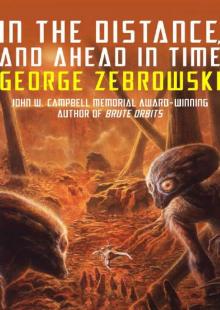 In the Distance, and Ahead in Time
In the Distance, and Ahead in Time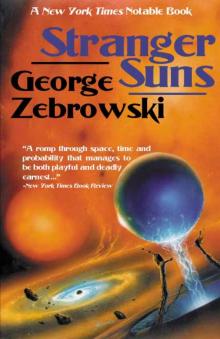 Stranger Suns
Stranger Suns Black Pockets
Black Pockets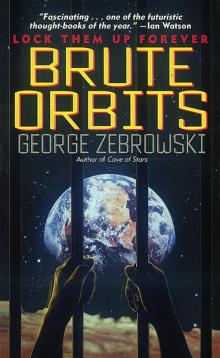 Brute Orbits
Brute Orbits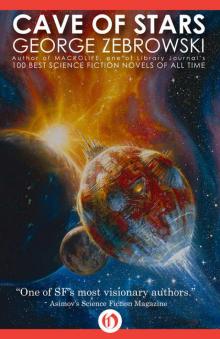 Cave of Stars (Macrolife Book 2)
Cave of Stars (Macrolife Book 2)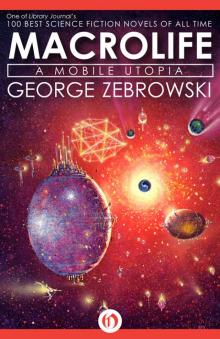 Macrolife
Macrolife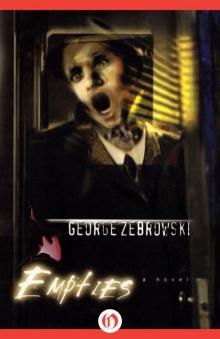 Empties
Empties Heart Of The Sun Star Trek 83
Heart Of The Sun Star Trek 83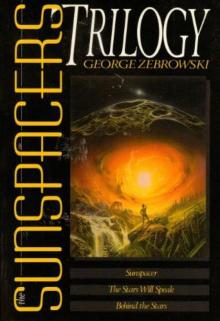 The Sunspacers Trilogy
The Sunspacers Trilogy